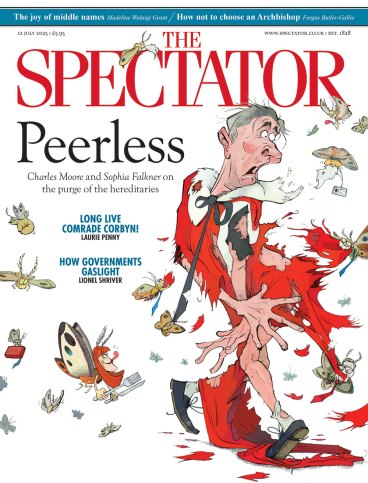
NHS origins
Sir: Your leading article ‘Wes or bust’ (5 July) credited Labour with founding the NHS. In fact, the NHS was founded during the second world war by the Labour, Liberal and Conservative coalition. The speech with the famous line ‘free at the point of use’ was in fact made by Winston Churchill. He made it because he was PM and it was his job. For Labour to claim to be the initiator is somewhat disingenuous.
Edward Hirst
Aston, Sheffield
All aboard
Sir: Michael Gove is quite right (‘Tracks of my tears’, 5 July): the retirement of the royal train is sad news for those of us who like trains and their history. Rather than the royal family viewing it as a liability, might it not still be a useful national asset? Back in 1933 the London and North Eastern Railway introduced a number of ‘camping coaches’ located in attractive locations around their network for holidaymakers – a kind of early version of Airbnb. Perhaps each year the royal train could be moved to a siding at a picturesque holiday location and rented out? The revenue raised would probably cover the costs of the train and it would be a link to the history of royal transport instead of simply languishing as an unused and static museum piece.
Jeremy White
Buxton, Derbyshire
For better or worse
Sir: Madeline Grant’s comments on wedding speeches (‘Speech impediment’, 5 July) rang true, as I recently attended some nuptials where we were asked to partake in ‘the warming of the rings’. One speaker read the ‘Apache Wedding Blessing’, an invention of a Brooklyn-born writer called Elliot Arnold. Among its platitudes, one ‘pleasing untruth about the perfection of the couple’ sprang out: ‘Now you will feel no storms… no cold… no loneliness’. As my wife and I celebrate eight years of marriage this month, we can confirm that this couldn’t be further from the truth. We would do better to learn from the more realistic perspective in Genesis 3: ‘And I will put enmity between you and the woman.’
Sam Finniear
Guildford, Surrey
Groaning shelves
Sir: I must take issue with Philip Hensher’s gloomy view of public libraries (‘Closed books’, 5 July). I tried his experiment and found on my local library’s shelves all the novels he mentioned, with the exception of Bennett’s The Old Wives Tale, although this may have been out on loan. Parenthetically, as well as Bleak House, I also found a remarkably beautiful leather-bound edition of Little Dorrit. Here in Glasgow at least, our public libraries appear to be in excellent health.
Dr Patrick Toal
Glasgow
On the same page
Sir: Philip Hensher’s thoughts about the decline of the traditional library and its lamentable replacement by the ‘community hub’ accorded with my own experience of being a professional librarian for 25 years. I, too, recall my local library heaving on Saturdays and was saddened to see it almost emptied of people on a return visit, with a greatly diminished book stock.
Pandering to the public’s wish for entertainment rather than edification has only hastened the demise of libraries. One of the few happy memories of three years in New Zealand was working in libraries there, which are models of what the service should be in Britain.
Mark Williamson
Tashkent, Uzbekistan
A borrower be
Sir: It was good to see Jane Austen’s Mansfield Park included in Philip Hensher’s ‘imperial’ dozen, since Fanny Price always loved a treasury of books, even to the extent of joining a lending library: ‘…but wealth is luxurious and daring, and some of hers found its way to a circulating library. She became a subscriber; amazed at being anything in propria persona, amazed at her own doings in every way, to be a renter, a chuser of books!’
David Maples
Petersfield, Hants
Precious smut
Sir: Steve Morris’s ‘Notes on… Postcards’ (5 July) highlighted the bawdy, innuendo-laden drawings that made the postcard a ‘cultural icon’. As works of folk art, the genre so captivated Michael Winner that he amassed almost 200 signed colour-washed designs by Donald McGill. Lacking display space, he kept them in a drawer for 25 years, admitting that ‘of an evening I’d take them out like Fagin taking out his jewellery, look at them and put them back’.
Peter Saunders
Salisbury, Wiltshire
Stones of remembrance
Sir: Anthony Bonnici’s instinct about the erasure of the dead from our collective consciousness (‘The architects redesigning death’, 28 June) is surely right. However, I cannot understand the aesthetic (and spiritual) sense that would prefer his polished and anonymous spheres to the earthy and particular beauty of ‘some shitty little gravestone’ in a churchyard.
G.E.M. Lippiatt
Ashburton, Devon
Speed bumps
Sir: I was amused by Martin Vander Weyer claiming that Lotus sports cars had long stood for engineering brilliance (5 July). I well remember that, as a 30-ish-year-old British petrol-head in the 1970s, Lotus was known to stand for ‘Lots Of Trouble Usually Serious’.
Alan Fearnley
Ilkley, Yorkshire
Write to us: letters@spectator.co.uk







Comments